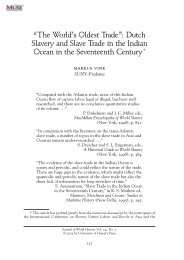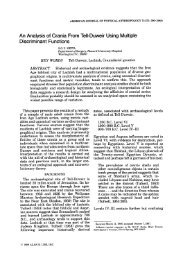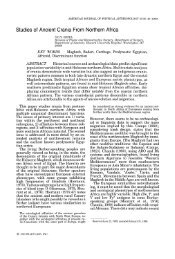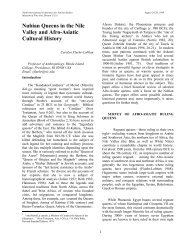THE FALSITY OF HEGEL'S THESES ON AFRICA
THE FALSITY OF HEGEL'S THESES ON AFRICA
THE FALSITY OF HEGEL'S THESES ON AFRICA
You also want an ePaper? Increase the reach of your titles
YUMPU automatically turns print PDFs into web optimized ePapers that Google loves.
Camara / HEGEL’S <strong>THE</strong>SES <strong>ON</strong> <strong>AFRICA</strong> 95<br />
NOTES<br />
1. Léopold Sédar Senghor, poet, essayist, scholar, and statesman, is considered the theorist<br />
of Negritude.<br />
2. The Hegelian theses on Africa are gathered in his The Philosophy of History (1991).<br />
3. Civilisation de l’Universel is the universal civilization: the ultimate civilization that<br />
incorporates the special and unique aspects of all cultures because it springs from the contact<br />
and dialogue between cultures.<br />
4. Senghor (1971) was well aware of the anteriority of Black African civilizations. He<br />
says, “Egypt founded the first of the historical civilizations. Europeans have tried in vain to<br />
refuse it this honor. In any event, it is the first of African civilizations” (p. 88). See also Diop<br />
(1967/1974, 1987).<br />
5. For Senghor, one of Africa’s specificities is its classless society (Markovitz, 1969).<br />
6. For Hegel on the state, see Hegel’s (1967) Philosophy of Right, pp. 115-223.<br />
7. Amin’s economic theory of “the deterioration of the terms of exchange” is often criticized<br />
as being moderate or disguising the fact that the West exploits an Africa already made<br />
dependent since colonization (see Amin, 1978).<br />
REFERENCES<br />
Amin, S. (1978). Accumulation on the world scale: A critique of the theory of underdevelopment.<br />
New York: Monthly Review Press.<br />
Coquery-Vidrovitch, C. (1997). Research on an African mode of production.In R. R. Grinker<br />
& C. B. Steiner (Eds.), Perspectives on Africa: A reader in culture, history, and representation<br />
(p. 129). Cambridge, MA: Blackwell.<br />
Diagne, P. (1976). De la démocratie traditionnelle [Of traditional democracy]. Présence<br />
Africaine, 97, 24.<br />
Dieng, A. A. (1975). Hegel, Marx, Engels et les problèmes de l’Afrique noire [Hegel, Marx,<br />
Engels and the problematics of Black Africa]. Dakar, Senegal: Sankoré.<br />
Diop, C. A. (1974). The African origin of civilization: Myth or reality (M. Cook, Trans.).<br />
Westport, CT: Lawrence Hill. (Original work published 1967)<br />
Diop, C. A. (1987). Precolonial Black Africa (M. Cook, Trans.). Westport, CT: Lawrence<br />
Hill.<br />
Engels, F. (1979). The origin of the family, private property, and the state. New York:<br />
Pathfinder.<br />
Fage, J. D. (1969). A history of West Africa: An introductory survey (4th ed.). London: Cambridge<br />
University Press.<br />
Fougeyrollas, P. (1974, February 15-March 6). Défi de la sécheresse et lutte en Afrique<br />
soudano-sahélienne [The drought challenge and the struggle in Sudano-Sahelian<br />
Africa]. Seminar on Environment and Economy in Arid and Semi-Arid Zones, Niamey.<br />
Godelier, M. (1975). La notion de “mode de production asiatique” et les schémas marxistes<br />
d’évolution des sociétés [The notion of “Asian mode of production” and the Marxist<br />
models of societal evolution] (Notebooks of the Center for Marxist Studies and<br />
Research). Paris: CERM.




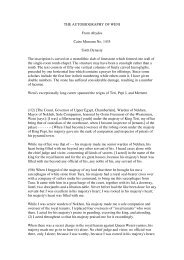
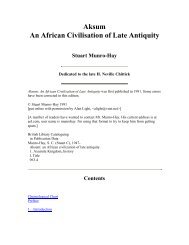
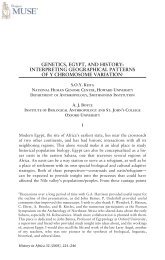
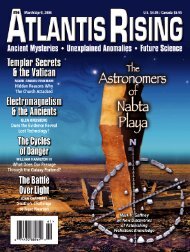
![The Negro trail blazers of California [microform] : a ... - Homestead](https://img.yumpu.com/32436613/1/174x260/the-negro-trail-blazers-of-california-microform-a-homestead.jpg?quality=85)
